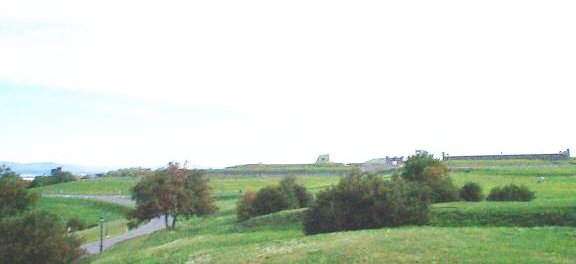It’s the Plains of Abraham for a Reason & other Quebec curios
I wonder what Mr. Abraham Martin is thinking as he looks down on modern Quebec society. In the sixteenth and early seventeenth century, the guy was probably trying to make a buck, or, should I say, a franc, and help raise a family in the unconquered Canadian wilderness (eh?). His thirty-two acres of land must have come in handy somehow, but centuries later, it, with some of the surrounding areas, is simply known as the Plains of Abraham. I imagine the poor guy uttering some interesting choice French phrases as rock bands and sports players alike jump around in what used to be his land. Or maybe not; maybe he’d like that stuff after all.
While not monumental for the Continent, the battle of the Plains of Abraham and the subsequent capitulation of New France by the British was a major defeat for France’s colonies in North America. The battle is part of the The Conquest (“La Conquête”), which itself is part of the North American wing of the Seven Years’ War. The Conquest is seen as a major turning point in Quebec history, both social and legal, the war that will bring the merging of two legal systems that would make Quebec a bi-judicial society: civil law from France, common law from England. Which also brings total confusion for McGill Law students.
While the Conquest leaves its shadow on Quebec history, possibly the most absurd thing is that historians are still fighting about it. (Typical!) Traditionally, the historians at the Université de Montréal think that the Conquest was actually a resignation and a death of a social consciousness that would not allow the French Quebecers to modernize until centuries later, while the historians at the Université de Laval think of it as a renewal and a chance for a new beginning. However, maybe it is a mix of both: while it the Conquest ultimately brought a somewhat positive impact to French Canada (apparently, they enjoyed the “innocent until proven guilty” thing quite a bit), but in tandem with the negative aspect that would disallow the modernisation of a people in societal construct and mindsets throughout the centuries as compared to, for instance, the Americans or the British. This shift in both mind and spirit would occur in the 1960s, of all times, with what would be termed the “Quiet” Revolution.
Possibly the most absurd thing of the war is what followed when the war ended: when the plans were all drawn up in the 1763 Treaty of Paris, France retained ownership of two small islands, St. Pierre and Miquelon, along with fishing rights in the area. France still owns these two islands. With a population of just a smidgen over six thousand people, with a majority of Roman Catholic people in the fishing industry, it is almost as if a part of the former French empire (such as it is) has frozen in time to an extent. So, if you want to go to France on the cheap (albeit less glamorous, no museums, possibly no hotels either–but it has an airport!), then save up and go there instead. Grab a fish or two while you’re there.
Share your love of history, law, and all things Quebec with T.A. Wellington at [email protected]






